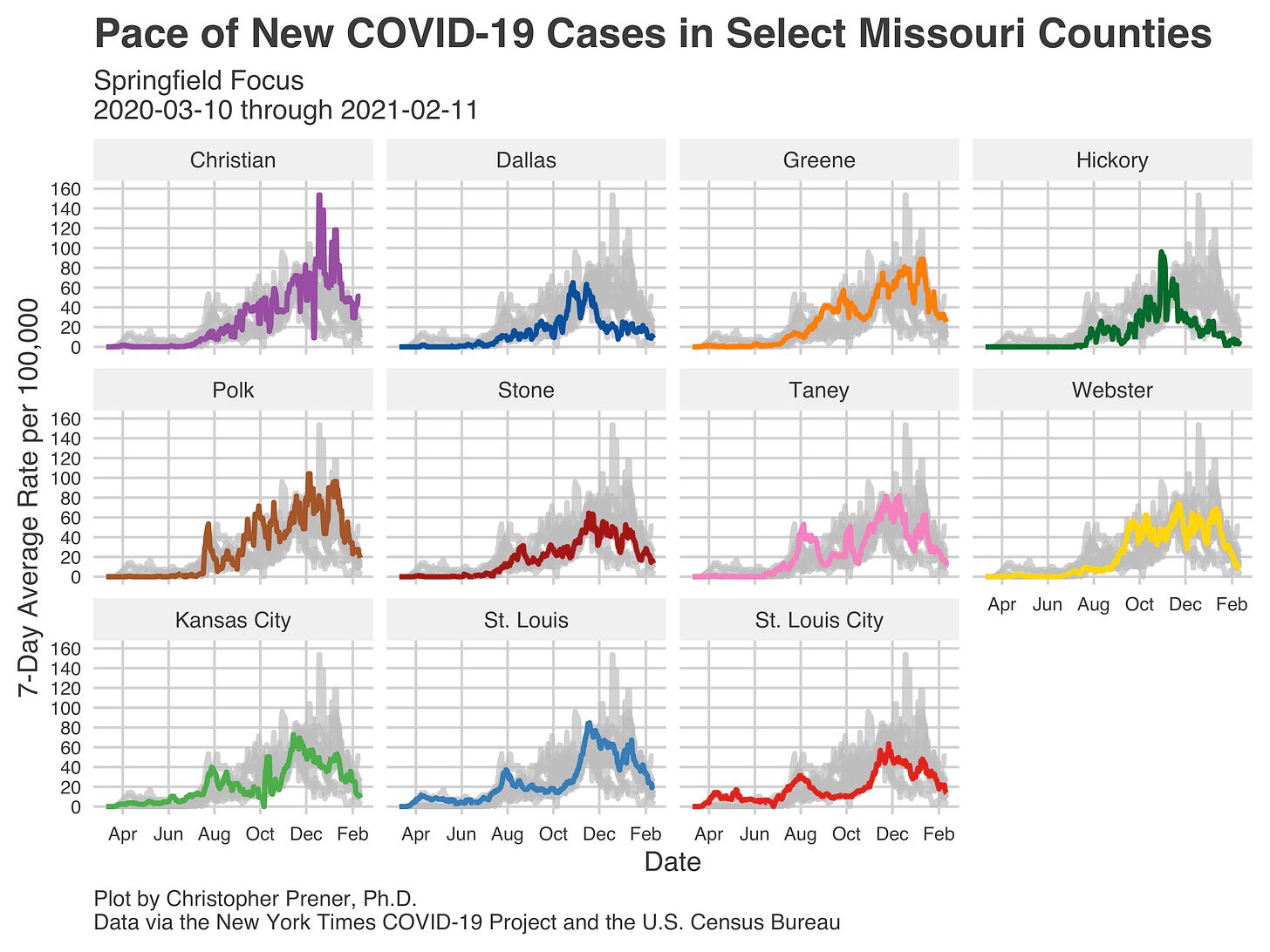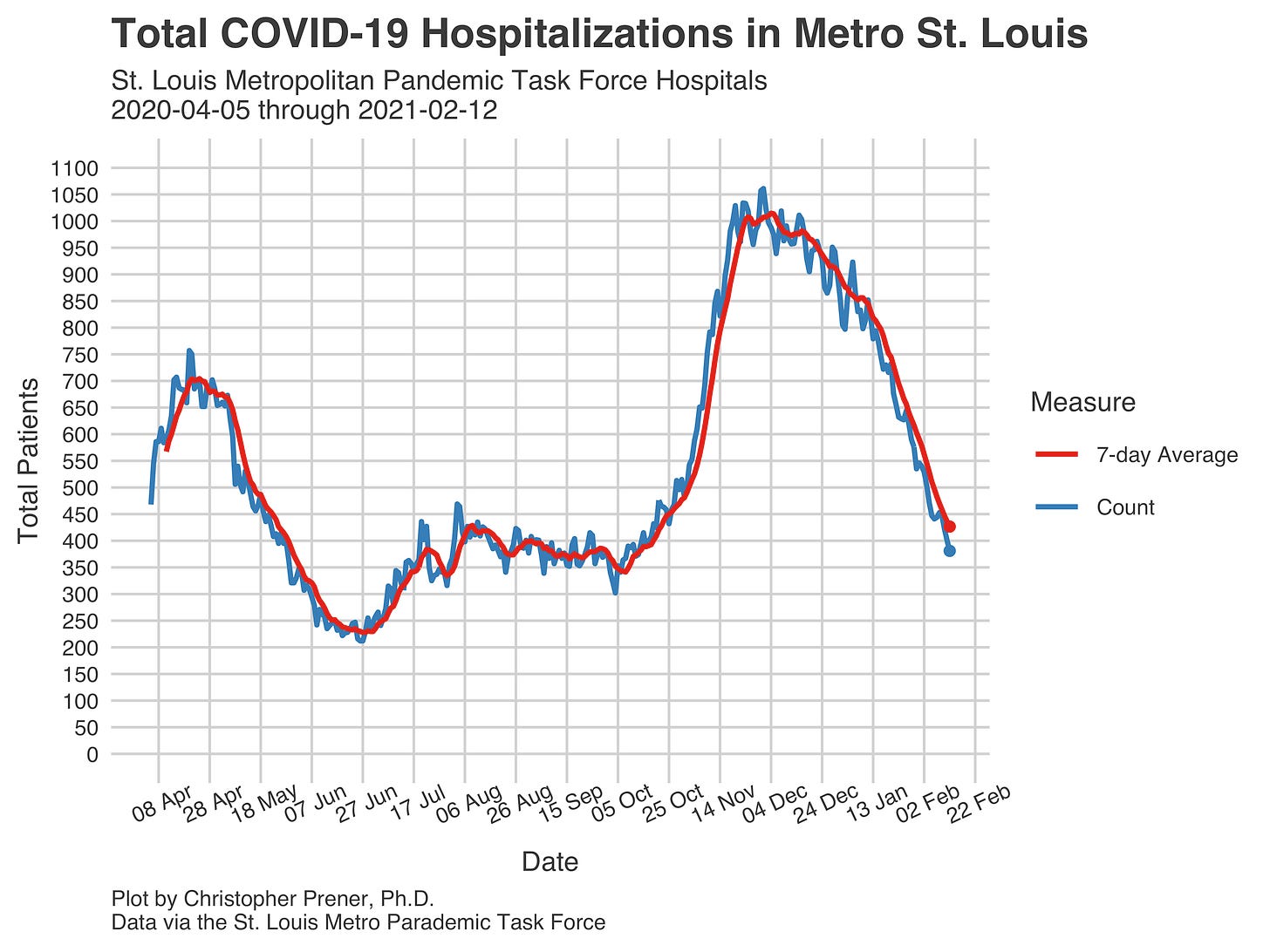In tonight’s edition, I look at our statewide declines and consider the new data we have on Missouri’s antigen testing. I also share some updates on vaccination in the St. Louis area and go “into the weeds” with some new Pew Research that shows that you are most certainly not alone if you are feeling overwhelmed and frustrated by the pandemic.
Finally, I also share my interview with fifth-generation St. Louis resident Spencer Toder, whose grandmother, Peggy Ross, touched many lives in the City and recently passed away from COVID. In a Ladue News article about her, she described her role on the board of Barnes-Jewish College’s Goldfarb School of Nursing - “If you don’t have good nurses, you might as well forget everything.” These are certainly words to live by, especially during a pandemic. In his interview, Spencer discusses her life and the loss her family has experienced. Please join me in thanking Spencer for his reflections, and I hope they resonate as much with you as they did with me. - Chris
COVID-19 by the Numbers
Total cases in MO: 506,647 (+5,593 from last Friday)
7-day average of new cases per day in MO: 1,053.57 (-295.29 from last Friday)
Counties with the highest per capita rates of new cases per day this past week:
Christian (51.19 per 100,000), Cape Girardeau (39.58), Ripley (37.56), Mercer (35.09), Adair (33.85), Carroll (29.08), Warren (29.07), Clay (25.85), and Greene (25.06)
These are the only counties in Missouri with per capita rates of new cases greater than 25.
Total deaths in MO: 7,798 (+258 from last Friday)
7-day average of new deaths per day in MO: 40 (-14 from last Friday)
These numbers are current as of Thursday, February 11th. Additional statistics, maps, and plots are available on my COVID-19 tracking site.
Summary for the Week Ending February 12th
This has been another week of large-scale declines in the pace of new cases throughout Missouri as well as in our neighboring states. Per capita rates at the state level are anywhere from a quarter to a bit less than half of their peak values in the late fall of 2020.
Within Missouri, we see broad declines in the three large regions where I track new case rates. These declines have been largely steady since our post-holiday spikes in early January when the numbers of new cases jumped upward again after experiencing steady declines from mid-November onward.
Only a few places within Missouri are currently experiencing upward trends. The two most prominent are in the Cape Girardeau and Springfield areas. Cape Girardeau has seen its per capita rate of new cases jump from about 20 new cases per 100,000 residents per day on average to around 40. Just to the south of Springfield, MO, Christian County has seen its per capita rate jump from about 30 to about 50.
These counties are outliers, however. You can see that regionally in both plots; they are really the only counties around them that are seeing increases in the number of cases. In the context of overall trends, these jumps are also relatively small. The rates that both counties are currently experiencing are far below their peaks.
One outstanding question is the role that antigen testing plays in biasing these numbers. This week, we are now getting statewide, daily updates on the number of presumed positive antigen tests that are not followed-up with a confirmatory PCR test. These new data have not altered my stance on the overall effect they have on our trends: the antigen test results only change the absolute number of new cases and not the general downward trend.
Based on Michele Munz’s reporting, I believe that the antigen results only really alter our data from early December onward. This means our post-Christmas bump was likely at least 20% higher. Our trend downward afterward has been less steep since the volume of antigen tests has grown over January and now encompasses just under a third of positive tests.
One reason I am confident that cases are falling downward is the hospitalization numbers here in St. Louis. The numbers of both in-patients overall and those who require ICU care have fallen back to near levels held steady through the summer and into the early part of the fall. These decreases strongly indicate that a decline in new cases is indeed occurring in our region.
Vaccination Update
The St. Louis Pandemic Task Force released an update on vaccination delivery and results to date. Next week, they are anticipating that 34% of the 97,500 vaccines will come to Region C (which stretches from Pike to Perry counties). This region contains 37% of the state’s population.
The Task Force also disclosed that 256,200 doses have been administered in Region C. Of these, 71% of them have been administered to white Missourians. I’ll be doing some work this week to contextualize these as per capita rates to give folks a sense of how even or uneven these rates are.
Into the Weeds
We have now been living with widespread COVID-19 in the United States for nearly a year, and with it in Missouri for about eleven months. Pew Research has new polling data that shows just how widespread the feelings of disruption and frustration are in the United States and Europe. Their report also shows that women report higher rates of disruption than men in the U.S. and elsewhere.
Weekly Interview
Spencer Toder is a 5th generation St. Louisan. He is a proud father, husband, and dog-dad. He is heavily involved in the entrepreneurial community and runs a medical device startup and a home rehab business.
Editor’s Note: this interview is about Spencer’s grandmother, Peggy Ross. You can read more about her life and legacy in this Ladue News article as well as on her St. Louis COVID Memorial page. Ms. Ross passed away due to COVID-19 on January 23, 2021, at the age of 90.
CP: You recently lost your grandmother, Peggy Ross. Can you tell us a bit about her life before we go any further?
ST: First of all, thank you for the opportunity to share what an amazing woman my grandmother was and the impact she has had on so many. My grandmother was one of the most passionate and inspirational people I’ve been lucky enough to know. Family was most important to her, but she treated so many people as family.
Born in 1930, my grandmother was conscious of the privilege she enjoyed in having the fortune to be educated at Washington University and spent her life ensuring that others received the same access to education. She was a force—she prided herself on this work and had a tremendous impact as she co-chaired the Scholarship Foundation’s capital campaign, raising $3.3 million in her youth (her 70s). That would go on to help create interest-free college and trade school loans for hundreds of Missourians.
In my grandma’s 30s, she was burned in a terrible fire. She spent months in the hospital and had nearly a year of care. Rather than let it define her, she founded a scholarship for nurses and dedicated it to the woman she credits with helping her live through that experience, Edna Malen. That is the kind of life she lived—she was a consummate optimist, and where she saw a need, she stepped up and made a difference.
CP: Before her illness, how had the pandemic affected Peggy, and how had it influenced your family’s relationship with her?
ST: My grandmother lived in a senior living community, and for the last ten months, she rarely strayed from her room. Prior to Covid, we had dinner every Sunday night and lunch at least once a week. Despite her age, she was very socially active, which was completely disrupted due to the pandemic. We were able to talk on the phone, and we would visit her outside in the parking lot of her building when the weather was warm, but we were all anxiously awaiting the time when everyone could be vaccinated and when she could safely reunite, in person, with our family.
CP: I’ve had the opportunity to read a bit about what you wrote after Peggy passed away. Can you share some of those emotions - what have the last few weeks been like for you and your family?
ST: This is the hardest question. Everyone deals with grief differently, and I have been struggling with appropriately grieving given the overwhelming anger I have at how this pandemic has been handled by people who are supposed to represent our interests. My grandmother would have already received her second vaccination shot in many other states prior to when she contracted Covid-19. I blame the governmental malpractice and incompetence for the fact that my grandmother was hospitalized five days prior to her scheduled first shot. It isn’t fair that people should have to watch their loved ones die on Zoom when it would have been perfectly avoidable. Others in my family are dealing with it differently. I don’t think there is a natural way to grieve during this time, particularly when so many of our traditional grieving rituals, such as being around friends and family and celebrating her life at a largely attended, are impossible currently.
CP: What lessons can we all learn from Peggy’s life, her illness, and her passing?
ST: To quote a tribute from another outstanding human who received the St. Louis Women of Achievement Award the same year as my grandma, my grandma taught her that “You can love someone and give yourself to them. You can also be an agent of change while doing so.” And further, “Lifting up others is more important than uplifting yourself.” “Finding ways to celebrate one’s differences is a beautiful thing.” Finally, “Nothing in this world, absolutely nothing, is more important than love.” I could write books on how she admired my grandfather for his intelligence and humor and how gracefully and beautifully she honored him in his later years as he suffered from Alzheimer’s, but all I can say is that these are just a few of the lessons that she passed on to her family and to everyone she ever knew.
CP: What is giving you hope right now in terms of COVID?
ST: Science. While I’ve been incredibly distraught by the lack of empathy and competence of so many in our country—particularly among elected officials—reading the research and speaking with scientists and experts gives me excitement that a cavalry of geniuses is coming to save the day. If we as a society can buy them time, I’m confident that we can get through this and am hopeful it is before more families are affected in such a tragic way.
If you like what you see here and don’t already, please subscribe!








